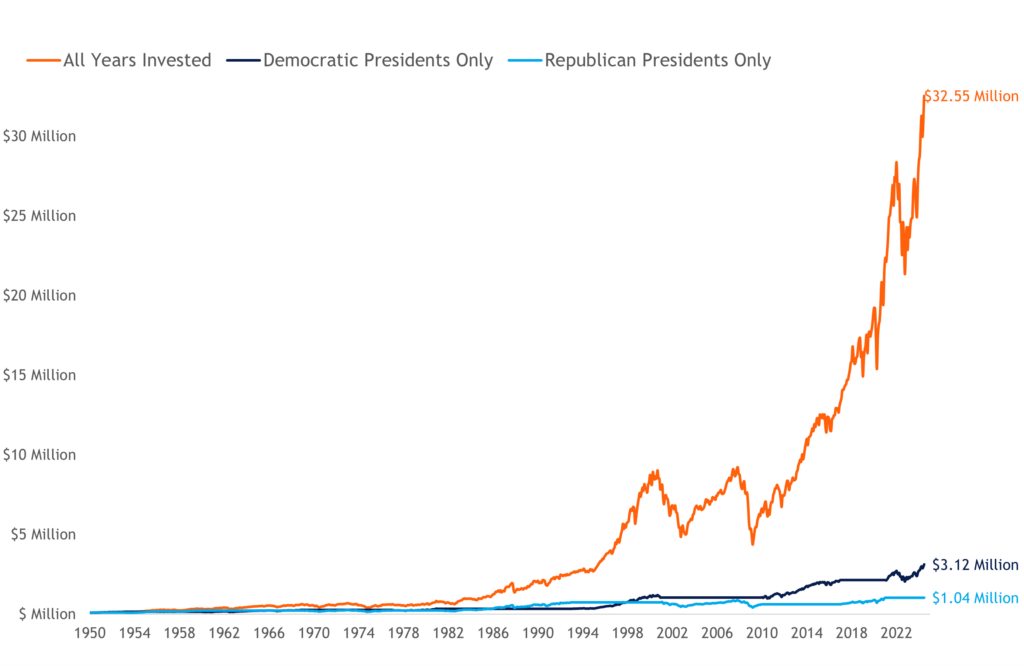Election Year Investment Strategies: Preparing for Market Volatility
As we gear up for another election season, are your investments prepared for the bumpy ride ahead?
So, election season brings a lot of uncertainty. Times like this are famously heavy in doom-and-gloom news and fear mongering. But that uncertainty isn’t just exclusive to the political news cycle — markets can be volatile, too.
Historical Market Performance During Election Years
Looking back, we see mixed market performances during election years. Investors tend to buy and sell a bit more erratically as they try to navigate the possibilities of major policy changes and the subsequent economic response.
Think about what happened in 2016 — the market took a nosedive on election night, then bounced back up the very next day. Talk about whiplash! 2020 experienced similar, perhaps even more dramatic, volatility with the additional uncertainty of the pandemic weighing in.
Political Affiliations vs. Investment Performance: Surprising Insights
Hearing this, you may be shocked to learn that investment performance is more influenced by policies than political affiliations. Take a look at this chart.

If you invested $100,000 in the S&P 500 back in 1950, but only remained invested during years when a Democrat was president, you would have around $3.1 million today, compared to $1.0 million if you only invested when a Republican was president.
Now, you may be thinking — that’s a pretty significant gap. And you’d be right… until you compare it to the $32.6 million you would have made if you bought and held the S&P 500 over the entire time frame. As we always say: time IN the market beats timing the market.
Sector-Specific Reactions to Election Outcomes
Different sectors react differently to election outcomes. Healthcare can show great volatility depending on candidates’ proposed changes, and energy can do the same. However, technology is historically steady during election times. Bank stocks may perform better under a Trump policy of deregulation whereas green energy and infrastructure stocks may do better under a second Biden administration (or an alternative Democratic candidate).
Congressional Setups and Stock Market Returns
Different congressional setups have differing effects, too. A Democratic president with a Republican or split Congress has historically generated average returns of near 16%. A Republican president with a split Congress is also good for stocks, with an average return for the S&P 500 of about 14%.
The less impressive returns have come during President George W. Bush’s administration, which included two bear markets in 2001–2002 and 2008 and dragged down average performance under Republican presidents with a unified Congress, either Dem or GOP.
Even with those two awful bear markets, the average S&P 500 return under those two congressional scenarios is still positive, though. So, if you think this pattern holds, we would argue that holding equities is still justified.
Navigating Election Season: Stay the Course
While some investors fear a downturn during election season, others see it as an opportunity. Needless to say, it can be a bit of an emotional time — but remember that emotions aren’t good decision makers. If you take one thing away from this week’s Fastest Four, let it be to stay the course. Buckle in for a few bumpy months ahead, stick to your long-term financial plan, and ride out the election season with confidence.
The opinions voiced in this video and blog are for general information only and are not intended to provide specific advice or recommendations for any individual.
Securities offered through LPL Financial, Member FINRA/SIPC. Investment advice offered through Independent Advisor Alliance. Independent Advisor Alliance and GenWealth Financial Advisors are separate entities from LPL Financial.





